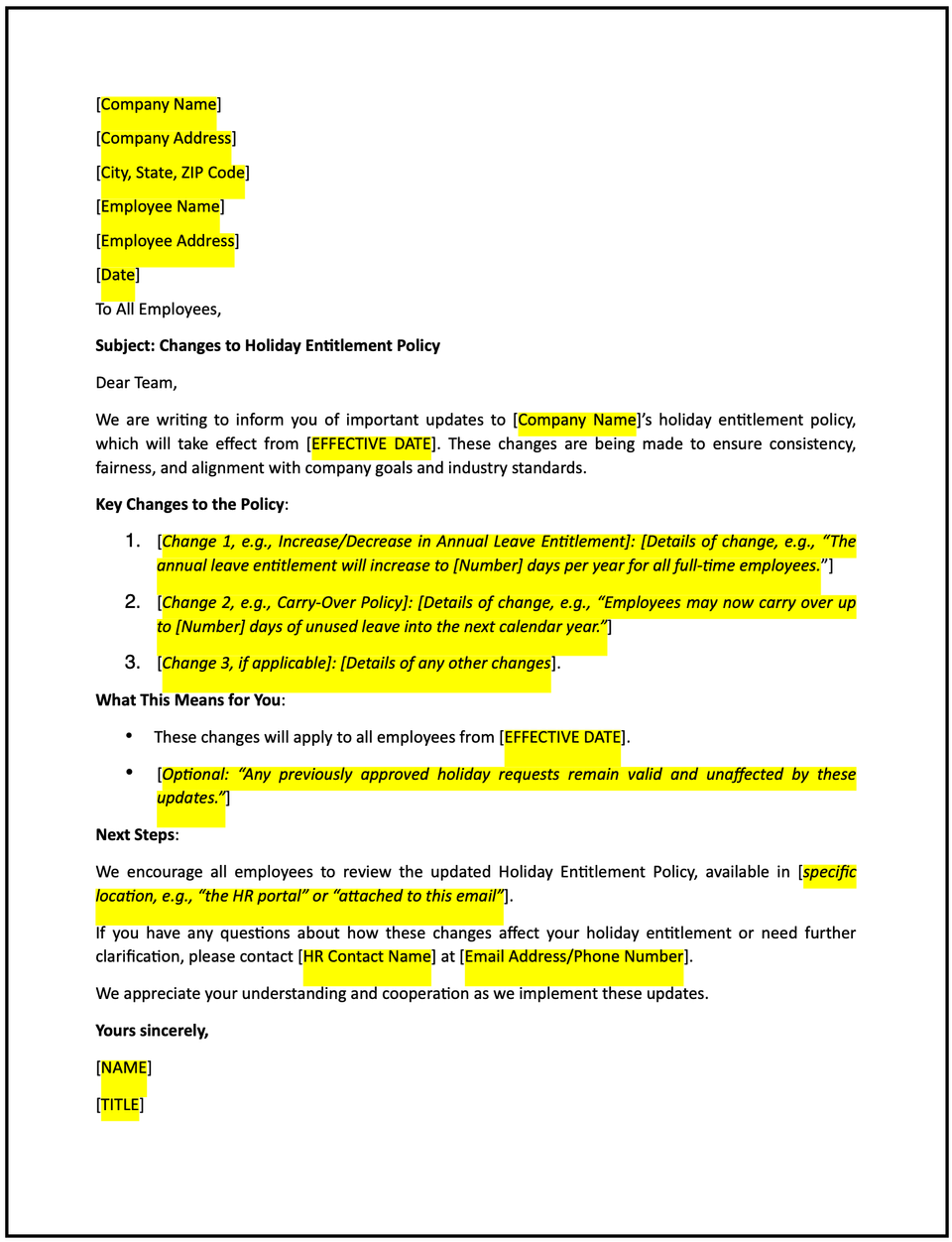Letter of changes to holiday entitlement policy: Free template

Letter of changes to holiday entitlement policy
A notification letter of changes to the holiday entitlement policy is a formal way to inform employees about updates to their holiday leave rules. This letter outlines the changes, their impact, and any actions employees need to take, ensuring transparency and alignment with company policies.
How to use this letter of changes to holiday entitlement policy
- Open with the purpose: Begin by stating that the letter is to inform employees of changes to the holiday entitlement policy.
- Specify the changes: Clearly describe the updates to the policy, such as new accrual methods, additional leave days, or adjustments to carryover rules.
- Provide the effective date: Indicate when the changes will take effect to help employees plan accordingly.
- Explain the reason: Briefly outline the rationale for the changes, such as aligning with industry standards, legal compliance, or organizational adjustments.
- Highlight the impact: Describe how the changes affect employees and any steps they need to take, such as reviewing their remaining leave or updating plans.
- Offer support: Provide resources, such as HR contacts or informational documents, to address questions or concerns.
- Maintain a professional tone: Ensure the letter is clear, respectful, and supportive.
- Provide contact information: Include details for employees to reach out for further clarification or assistance.
Benefits of using a letter of changes to holiday entitlement policy
This letter template ensures a structured and professional way to communicate holiday policy updates while fostering clarity and goodwill. Here’s how it helps:
- Promotes transparency: Clearly outlining the changes minimizes misunderstandings and confusion.
- Reflects professionalism: A well-crafted letter demonstrates respect and consideration for employees.
- Encourages planning: Providing details about the changes allows employees to adjust their schedules accordingly.
- Reduces disputes: Clear communication ensures alignment with the new policy and minimizes potential dissatisfaction.
- Provides documentation: A formal record of the notification is valuable for HR and compliance purposes.
Tips for writing an effective letter of changes to holiday entitlement policy
- Be specific: Clearly describe the policy changes, including details about how they affect employees.
- Use professional language: Maintain a respectful and supportive tone to encourage understanding.
- Highlight the rationale: Provide a brief explanation for the changes to build trust and transparency.
- Include next steps: Mention any actions employees need to take, such as reviewing their entitlement or contacting HR for clarification.
- Keep it concise: Focus on the key points while ensuring the tone is clear and professional.
Frequently asked questions (FAQs)
Q: What details should I include in this letter?
A: Include the specific policy changes, effective date, rationale, impact on employees, and any required actions.
Q: Should I personalize the letter?
A: Yes, addressing employees collectively or individually ensures clarity and attentiveness.
Q: Who typically sends this letter?
A: The HR department or management team usually sends this letter.
Q: How formal should this letter be?
A: The tone should be professional yet supportive, focusing on clarity and understanding.
Q: When should this letter be sent?
A: Send the letter well in advance of the changes to allow employees sufficient time to prepare.
Q: Can this letter include examples of how the changes affect entitlement?
A: Yes, examples can help employees better understand the nature of the changes.
Q: Is acknowledgment from the recipient required?
A: While not mandatory, requesting acknowledgment ensures employees are aware of and understand the changes.
This article contains general legal information and does not contain legal advice. Cobrief is not a law firm or a substitute for an attorney or law firm. The law is complex and changes often. For legal advice, please ask a lawyer.


